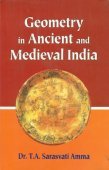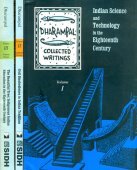Algebra: 1 definition
Introduction:
Algebra means something in Hinduism, Sanskrit. If you want to know the exact meaning, history, etymology or English translation of this term then check out the descriptions on this page. Add your comment or reference to a book if you want to contribute to this summary article.
In Hinduism
Ganitashastra (Mathematics and Algebra)
Source: archive.org: Hindu MathematicsAlgebra (in Sanskrit: bījagaṇita or avyaktagaṇita) refers to the “science of calculation”, according to the principles of Gaṇita-śāstra, ancient Indian mathematics and astronomy.—Algebra (bījagaṇita) is also called avyaktagaṇita or “the science of calculation with unknowns” (avyakta=unknown) in contradistinction to the name vyaktagaṇita or “the science of calculation with knowns” (vyakta=known) for arithmetic including geometry and mensuration. According to Bhāskara II, algebra (bījagaṇita) may be defined as the science which treats of numbers expressed by means of symbols, and in which there is scope and primary need for intelligent artifices and ingenious devices. The origin of Hindu algebra can be definitely traced back to the period of the Śulba (800-500 B.C.) and the Brāhmaṇa (c. 2000 B.C.). But it was then mostly geometrical.
The early Hindus regarded algebra as a science of great importance and utility. In the opening verses of the Brāhmasphuṭasiddhānta (treatise on algebra), Brahmagupta (628) observes: “Since questions can scarcely be known (i.e., solved) without algebra, therefore, I shall speak of algebra with examples. [...] By knowing the pulveriser, zero, negative and positive quantities, unknowns, elimination of the middle term, equations with one unknown, factum and the Square-nature, one becomes the learned professor (ācārya) amongst the learned”.
The science of algebra is broadly divided by the Hindus into two principal parts. Of these - the most important one deals with analysis (bija). The other part treats of the subjects which are essential for analysis. They are: the laws of signs, the arithmetic of zero (and infinity), operations with unknowns, surds, the pulveriser (or the indeterminate equation of the first degree), and the Square-nature (or the so-called Pellian equation). To these some writers add concurrence and dissimilar operations, while others include them in arithmetic.

Ganitashastra (शिल्पशास्त्र, gaṇitaśāstra) refers to the ancient Indian science of mathematics, algebra, number theory, arithmetic, etc. Closely allied with astronomy, both were commonly taught and studied in universities, even since the 1st millennium BCE. Ganita-shastra also includes ritualistic math-books such as the Shulba-sutras.
See also (Relevant definitions)
Full-text (+438): Bijaganita, Avyaktarashi, Kshaya, Avyaktaganita, Padmanabhabija, Laghumula, Sthirakuttaka, Adikarana, Vargamula, Vijaganita, Ghataprakashaka, Bijamati, Yogabhavana, Madhyamaharana, Madhyamakhanda, Nirapavarta, Shabalaka, Yavattavat, Niccheda, Ganita.
Relevant text
Search found 16 books and stories containing Algebra; (plurals include: Algebras). You can also click to the full overview containing English textual excerpts. Below are direct links for the most relevant articles:
Bachelor < [October 1969]
The Glory Land that was India Role of < [January – March, 1999]
Mother India < [July-September, 1928]
Formal Education System in Ancient India (by Sushmita Nath)
Subjects studied in the Sūtra Period < [Chapter 5 - Subjects studied in the Vedic and Buddhist period]
Significance of the Moon in Ancient Civilizations (by Radhakrishnan. P)
7. Watery Moon < [Chapter 15 - Conclusion]
Mahabharata (English) (by Kisari Mohan Ganguli)
Section CCXXXIII < [Mokshadharma Parva]
Complete works of Swami Abhedananda (by Swami Prajnanananda)
Chapter 5 - Education in India < [Discourse 1 - India and Her People]
Chapter 6 - The Influence of India on Western-Civilization < [Discourse 1 - India and Her People]
Chapter 1 - The Ideal of Education < [Discourse 2 - The Ideal of Education]
The Scientific Outlook Of Buddhism (by Wang Chi Biu)
Related products

